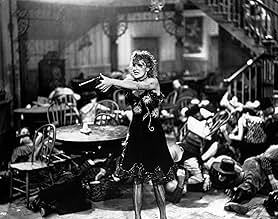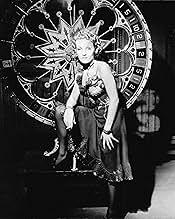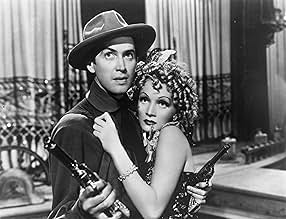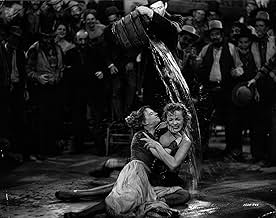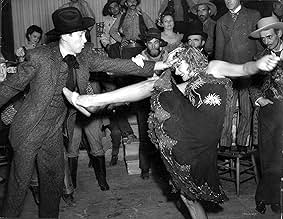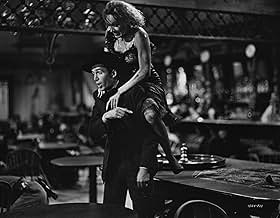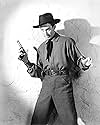VALUTAZIONE IMDb
7,6/10
13.175
LA TUA VALUTAZIONE
Lo sceriffo della contea Destry sorveglia la città di Bottle Neck, inclusa anche la cantante del saloon Frenchy.Lo sceriffo della contea Destry sorveglia la città di Bottle Neck, inclusa anche la cantante del saloon Frenchy.Lo sceriffo della contea Destry sorveglia la città di Bottle Neck, inclusa anche la cantante del saloon Frenchy.
- Regia
- Sceneggiatura
- Star
- Premi
- 5 vittorie totali
Recensioni in evidenza
. . . this is what they mean.
I'm intrigued by the voting on this movie as I can't imagine any scale on which it wouldn't get top marks. Where exactly does it drop the ball? Cast - inspired; performances - stellar; script - faultless; direction - millimetre perfect; score - find me one better, ("See what the boys in the back room will have" has gone into the language).
Is it because it's not an arthouse movie? Or because of the dangerous idea that restraint, cool and smarts are more effective weapons than playground bully tactics?
As far as I am concerned, if you want to know how to put a movie together, you can start here. 10/10 is the only possible mark for a masterpiece.
I'm intrigued by the voting on this movie as I can't imagine any scale on which it wouldn't get top marks. Where exactly does it drop the ball? Cast - inspired; performances - stellar; script - faultless; direction - millimetre perfect; score - find me one better, ("See what the boys in the back room will have" has gone into the language).
Is it because it's not an arthouse movie? Or because of the dangerous idea that restraint, cool and smarts are more effective weapons than playground bully tactics?
As far as I am concerned, if you want to know how to put a movie together, you can start here. 10/10 is the only possible mark for a masterpiece.
It is true that there are parody elements in George Marshall's delightful "Destry Rides Again" but the real humor lies not so much in these sorts of antics, nor the heavily laid on inquiries of Marlene Dietrich as to the tastes of the backroom boys, but rather in James Stewart's no-gun Destry characterization
This springs from the same source as Ford's 'characters', recognizable frontier independent-minded eccentrics, with a firm footing in American literature; characters often with a roundabout way of making a point, or pointing a moral, as with Destry's habit of prefacing each little cautionary parable with: 'I knew a fellow once who ' A habit that inevitably drew the aggrieved riposte: 'You know too many fellows, Destry '
The other 'characters' in this film have more than a color or two of parodyMischa Auer's improbable Slavonic cowboy, Charles Winninger's town drunk, Brian Donlevy, unprincipled boss, and Samuel S. Hinds' nicely played judge
In retrospect, it's odd how much this movie gains from its rather touching little postscript Stewart, the unconventional lawman, having pacified his cowtown, strolls the streets with a hero-worshiping lad at his heels, and yet also takes a little cloud of sadness along with him
Marshall's film is considered a classic Western which manages to encompass suspense, comedy, romance, tenderness, vivid characterization, horseplay, songs and standard western excitements, without moving for more than a moment from a studio main street set Hollywood expertise at its very best...
This springs from the same source as Ford's 'characters', recognizable frontier independent-minded eccentrics, with a firm footing in American literature; characters often with a roundabout way of making a point, or pointing a moral, as with Destry's habit of prefacing each little cautionary parable with: 'I knew a fellow once who ' A habit that inevitably drew the aggrieved riposte: 'You know too many fellows, Destry '
The other 'characters' in this film have more than a color or two of parodyMischa Auer's improbable Slavonic cowboy, Charles Winninger's town drunk, Brian Donlevy, unprincipled boss, and Samuel S. Hinds' nicely played judge
In retrospect, it's odd how much this movie gains from its rather touching little postscript Stewart, the unconventional lawman, having pacified his cowtown, strolls the streets with a hero-worshiping lad at his heels, and yet also takes a little cloud of sadness along with him
Marshall's film is considered a classic Western which manages to encompass suspense, comedy, romance, tenderness, vivid characterization, horseplay, songs and standard western excitements, without moving for more than a moment from a studio main street set Hollywood expertise at its very best...
Destry Rides Again (1939)
A brilliantly made spoof of the early American Western. This came out at a strange time for this kind of reflective comedy, because in fact the Western was just this year having a revival with three serious Westerns including John Ford's legendary Stagecoach. But the fixtures of this kind of movie were well in place--the barroom brawl, the bad men and their guns, the good sheriff coming to the rescue, the sweet untainted woman and the quasi-whorehouse type woman, and of course the final shootout. It's all here. And it's a wild ride done with subtlety, a difficult combination to pull off.
It's fun to see this movie and then compare to the later generation of take-offs and spoofs that take themselves much more seriously--the spaghetti Westerns of the 1960s. These, too, used all the clichés of the Western to make an amusing reference to those types. The reason why those movies worked so well, and why Destry does, too, is that these are attractive archetypes. We see ourselves in these people, somehow, and yet not too closely. We identify with them (especially Jimmy Stewart the sheriff and Marlene Dietrich the bad woman with a good heart who can sing, too) and yet know they are all artifice, just as in a play. The illusion of reality is damped down by the excess and the fun, and the obvious exaggerations.
As for director George Marshall, he's a hardened Hollywood veteran most famous, perhaps, for a long string of golf movies (yes golf, the sport). But his expertise, and his willingness to go for broke with scenes involving dozens or even hundreds of people, and to use the camera vigorously, and to realize he had two of the greatest actors he could ask for (Stewart toward the beginning of his career, and Dietrich still a great star though cast against her normal romanticized type from the early 1930s) is phenomenal. You'll shake your head and laugh at the same time.
In fact, it is the chemistry of the two stars that gives the movie surprising depth. It's not just a farce. It talks about pacifism just as World War II is brewing. And it suggests something about true love as much as carnal attraction. All while the world is exploding around the two leads, almost literally, as you'll see. And whatever might happen on screen by the end, it's fun to know that the two had a real affair offscreen, with some hush hush scandal to follow years later.
Watch this and laugh and maybe even cry a little. Great stuff.
A brilliantly made spoof of the early American Western. This came out at a strange time for this kind of reflective comedy, because in fact the Western was just this year having a revival with three serious Westerns including John Ford's legendary Stagecoach. But the fixtures of this kind of movie were well in place--the barroom brawl, the bad men and their guns, the good sheriff coming to the rescue, the sweet untainted woman and the quasi-whorehouse type woman, and of course the final shootout. It's all here. And it's a wild ride done with subtlety, a difficult combination to pull off.
It's fun to see this movie and then compare to the later generation of take-offs and spoofs that take themselves much more seriously--the spaghetti Westerns of the 1960s. These, too, used all the clichés of the Western to make an amusing reference to those types. The reason why those movies worked so well, and why Destry does, too, is that these are attractive archetypes. We see ourselves in these people, somehow, and yet not too closely. We identify with them (especially Jimmy Stewart the sheriff and Marlene Dietrich the bad woman with a good heart who can sing, too) and yet know they are all artifice, just as in a play. The illusion of reality is damped down by the excess and the fun, and the obvious exaggerations.
As for director George Marshall, he's a hardened Hollywood veteran most famous, perhaps, for a long string of golf movies (yes golf, the sport). But his expertise, and his willingness to go for broke with scenes involving dozens or even hundreds of people, and to use the camera vigorously, and to realize he had two of the greatest actors he could ask for (Stewart toward the beginning of his career, and Dietrich still a great star though cast against her normal romanticized type from the early 1930s) is phenomenal. You'll shake your head and laugh at the same time.
In fact, it is the chemistry of the two stars that gives the movie surprising depth. It's not just a farce. It talks about pacifism just as World War II is brewing. And it suggests something about true love as much as carnal attraction. All while the world is exploding around the two leads, almost literally, as you'll see. And whatever might happen on screen by the end, it's fun to know that the two had a real affair offscreen, with some hush hush scandal to follow years later.
Watch this and laugh and maybe even cry a little. Great stuff.
When the Sheriff of Bottleneck asks one too many questions about the legitimacy of Kent's card games, he winds up dead and the new sheriff is the town drunk. The corrupt forces behind Bottleneck think that things will be just how they like it from now on but don't figure that the drunk will call in help in the form of a deputy, Tom Destry son of the famous lawman. However Destry Jr turns out to not only be against carrying guns but also be soft-spoken and good humour not characteristics that Wash hoped for in his deputy. However with a culture of silence, gun crime widespread and the town in the grip of the sultry and dangerous Frenchy, can Destry make an impact? Although I always find it difficult to watch large sections of this film without recalling the hilarious Blazing Saddles I do enjoy the mix of comedy, drama and dark content in this film and find it eminently enjoyable. From the very start, the tone is raucous and comic and the addition of Stewart only serves to make it seem even more whimsical. And for the most part it is just like this broad fun with gentle laughs and good-natured playing all round. This is fine and makes for a fun film but it is the extra stuff that makes it gain momentum towards the end and not just end up like a big puff of nothing much; the drama is tense, the writing is brave and the action is pretty enjoyable. It isn't amazing stuff though and it could be argued that the sudden rush of blood at the end doesn't sit that well with the relaxed pace it had early on but for me it phased from one aspect into the other pretty well and the conclusion actually made it feel weightier than the majority had actually been.
The cast make it work of course, despite the risks taken. With events as they were at the time, Dietrich was considered a risk but she pays off well and is a great central character providing laughs and some real energy in her character and the musical numbers. Stewart has great chemistry with her, even if the script didn't make their relationship totally convincing. He plays his usual type of role but he does it very well and he mixes his gentle comic touch with Dietrich's bawdry style. The support cast are roundly great and people like Auer, Winninger, Donlevy and others all make sure that the film is not being carried by the two leads but is rather a group effort.
Overall a great comedy western that has more to it than you think. Unlikely to win over younger viewers weaned on constant action or big gross-out laughs but it is an effortless watch with gentle humour, great musical numbers, some tension, good action, great acting and a whole experience that has an enjoyable swagger to it while also winking to the audience for the most part.
The cast make it work of course, despite the risks taken. With events as they were at the time, Dietrich was considered a risk but she pays off well and is a great central character providing laughs and some real energy in her character and the musical numbers. Stewart has great chemistry with her, even if the script didn't make their relationship totally convincing. He plays his usual type of role but he does it very well and he mixes his gentle comic touch with Dietrich's bawdry style. The support cast are roundly great and people like Auer, Winninger, Donlevy and others all make sure that the film is not being carried by the two leads but is rather a group effort.
Overall a great comedy western that has more to it than you think. Unlikely to win over younger viewers weaned on constant action or big gross-out laughs but it is an effortless watch with gentle humour, great musical numbers, some tension, good action, great acting and a whole experience that has an enjoyable swagger to it while also winking to the audience for the most part.
1939 that celebrated high point of the Hollywood studio system turned out to be the break out year for James Stewart. His career kicked into high gear with Destry Ridges Again and Mr. Smith Goes to Washington. From just a good leading man these films guaranteed Jimmy Stewart screen immortality.
Destry was equally an important film for Marlene Dietrich. Her career had come to a standstill and she had been let go from her original American studio, Paramount. A whole lot of people said she was through in Hollywood, but Marlene showed them all.
This is the second film adaption of the story, a 1932 version was done by Tom Mix, one of his last films and one of his few sound ones. This one however is THE standard version.
Destry Rides Again was directed by George Marshall who was very good at mixing humor and drama to make some great films. This one is probably Marshall's greatest. Among Hollywood directors from the studio age, he is sadly forgotten.
The town of Bottleneck is one rip roaring place with a whole lot of promiscuous shooting going on. It's a pretty corrupt place run by saloon owner Brian Donlevy and his stooge mayor Samuel S. Hinds. When the sheriff is killed they 'elect' the town drunk Charles Winninger as the new sheriff.
But Winninger who was a deputy sheriff at one time sends for the son of his former boss Thomas Jefferson Destry played by Jimmy Stewart. Destry makes quite an entrance into Bottleneck, running afoul of saloon entertainer Marlene Dietrich. His arrival in Bottleneck up to his first encounter with Marlene are some of the funniest moments ever put on screen.
Destry Rides Again gave Marlene one of her classic ballads, See What the Boys in the Backroom Will Have as well as Little Joe, the Wrangler. Who would ever have thought that the girl from Germany would wind up having one of her most noted film roles as a western saloon entertainer. But Marlene created an indelible character, so much so that Mel Brooks and Madeline Kahn gave her a real heartfelt tribute in Blazing Saddles. I'll bet Marlene enjoyed that one also.
James Stewart did not return to the western genre until Winchester 73 and Broken Arrow eleven years later. But this was one great film to make a debut in that film art form.
You won't indulge in any promiscuous shooting while Destry is on the job.
Destry was equally an important film for Marlene Dietrich. Her career had come to a standstill and she had been let go from her original American studio, Paramount. A whole lot of people said she was through in Hollywood, but Marlene showed them all.
This is the second film adaption of the story, a 1932 version was done by Tom Mix, one of his last films and one of his few sound ones. This one however is THE standard version.
Destry Rides Again was directed by George Marshall who was very good at mixing humor and drama to make some great films. This one is probably Marshall's greatest. Among Hollywood directors from the studio age, he is sadly forgotten.
The town of Bottleneck is one rip roaring place with a whole lot of promiscuous shooting going on. It's a pretty corrupt place run by saloon owner Brian Donlevy and his stooge mayor Samuel S. Hinds. When the sheriff is killed they 'elect' the town drunk Charles Winninger as the new sheriff.
But Winninger who was a deputy sheriff at one time sends for the son of his former boss Thomas Jefferson Destry played by Jimmy Stewart. Destry makes quite an entrance into Bottleneck, running afoul of saloon entertainer Marlene Dietrich. His arrival in Bottleneck up to his first encounter with Marlene are some of the funniest moments ever put on screen.
Destry Rides Again gave Marlene one of her classic ballads, See What the Boys in the Backroom Will Have as well as Little Joe, the Wrangler. Who would ever have thought that the girl from Germany would wind up having one of her most noted film roles as a western saloon entertainer. But Marlene created an indelible character, so much so that Mel Brooks and Madeline Kahn gave her a real heartfelt tribute in Blazing Saddles. I'll bet Marlene enjoyed that one also.
James Stewart did not return to the western genre until Winchester 73 and Broken Arrow eleven years later. But this was one great film to make a debut in that film art form.
You won't indulge in any promiscuous shooting while Destry is on the job.
Lo sapevi?
- QuizAccording to her grandson Peter Riva, who was interviewed for the Icons Radio Hour, Marlene Dietrich's fight scene was unchoreographed. She and Una Merkel agreed to do it impromptu with the only rule being no closed fists. They used feet, pulled hair, and Marlene had bruises for weeks afterwards, but the director got everything in one take.
- BlooperTom Destry (James Stewart) makes the typical movie actor mistake of shooting his pistol at something by jerking the pistol and firing the gun at the target at the same time. In reality, if a shooter did that he would be moving the pistol off line and would miss every time, because the motion of the hand would impart a vector onto the bullet that would make it miss. Also, shooting that way is incredibly inaccurate. A real shooter would level the pistol at the target and then pull the trigger. Audie Murphy, a trained marksman, shot his pistols correctly in the remake Storia di Tom Destry (1954).
- Citazioni
Tom Destry Jr.: Oh, I think I'll stick around. Y'know, I had a friend once used to collect postage stamps. He always said the one good thing about a postage stamp: it always sticks to one thing 'til it gets there, y'know? I'm sorta like that too.
- ConnessioniFeatured in AFI Life Achievement Award: A Tribute to James Stewart (1980)
- Colonne sonoreSee What the Boys in the Back Room Will Have
(1939) (uncredited)
Lyrics by Frank Loesser
Music by Friedrich Hollaender
Sung by Marlene Dietrich
I più visti
Accedi per valutare e creare un elenco di titoli salvati per ottenere consigli personalizzati
- How long is Destry Rides Again?Powered by Alexa
Dettagli
Botteghino
- Lordo Stati Uniti e Canada
- 345.000 USD
- Tempo di esecuzione
- 1h 35min(95 min)
- Colore
- Proporzioni
- 1.37 : 1
Contribuisci a questa pagina
Suggerisci una modifica o aggiungi i contenuti mancanti


